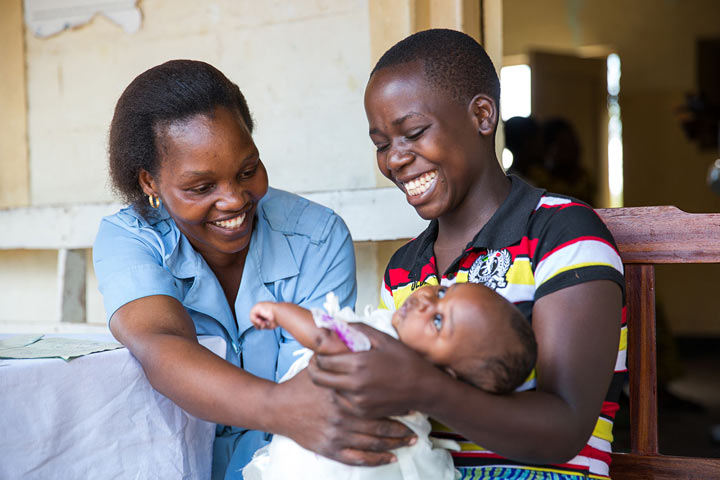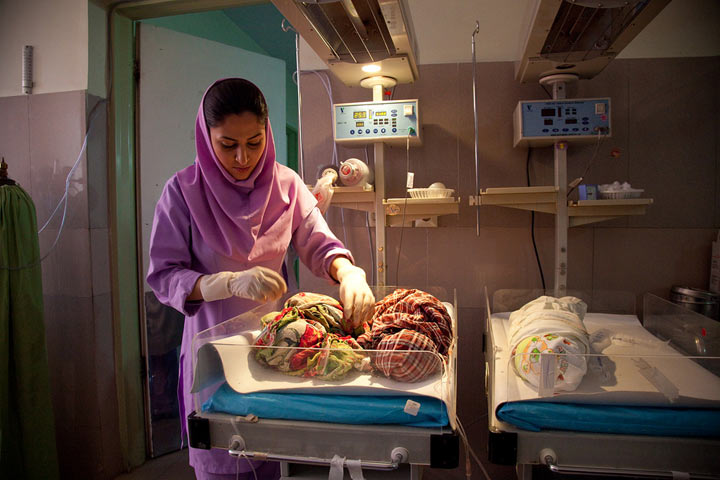TORONTO – Prime Minister Harper is hosting a three-day summit to refocus attention on helping dying babies and moms in developing countries—a project he first unveiled when Canada hosted the G8 summit in 2010.

The $2.8-billion Muskoka Initiative included dozens of projects, and was meant to increase positive health outcomes such as preventing child and mother deaths, improve prenatal and postpartum care, increase health education and treatment and prevention of diseases.
WATCH: The Harper government pledged billions to improve the health of women and young children in developing countries. But as Mike Drolet reports, some critics are questioning whether ideology is driving how the money is being doled out.
So what’s changed?
Plan Canada received $45 million from the government and another $10 million matched by Canadian donors for projects across seven countries, and has seen positive results so far:
Plan Canada says its work in five countries (Bangladesh, Ethiopia, Ghana, Mali, Zimbabwe) has shown “remarkable preliminary results,” in changes from June 2012 to Dec. 2013, including:
- Women who received care from a skilled health provider at least four times during their pregnancy increased from 45.5% to 63.2%
- Mothers and babies who received health care within 3 days of childbirth increased from 38.7% to 54.5%
- Children who were vaccinated against measles increased from 41% to 65.7%
- The percentage of live births attended by skilled health personnel rose from 50.3% to 56%
- More than 63,000 health workers were trained in maternal, newborn and child health
In Tanzania, the organization says the number of mothers reached by programs who received postnatal care within three days of childbirth rose from 30 per cent to 71 per cent.
READ MORE: Melinda Gates ‘supports’ Harper’s child and maternal health plan
Plan Canada’s Amanda Sussman said one of the steps forward the Muskoka Initiative took was providing a “basket of services” delivered at one time instead of interventions that were disease-specific.
“Why a basket? Well If you have a community health worker meeting with a mother in the field, it’s an opportunity not just to immunize her children, but also to talk to her about breastfeeding, also to talk to her about antenatal care…so we don’t say we should prioritize this area over another; we talk about delivery of a basket to even more women.”
Sussman believes the Muskoka Initiative has provided resources that allow organizations to track and report results, so they can compare data to a baseline and show specifically where taxpayer dollars have gone.
“I think it’s setting a really important precedent as we move forward to one, see a greater commitment to maternal newborn and child health so we can finish the job, but also the post-2015 development agenda as a whole.”
And post-2015 is where World Vision Canada’s senior policy advisor on child health is looking, since that’s when the Muskoka money runs out.
Sara Schulz said Canada’s initiative was catalytic in that other G8 leaders, philanthropists and businesses came together to put money on the table for maternal health.
“For example, if you look at 2010 and you look at 2012—two years later – we know that 400,000 more children are living to their fifth birthdays, and it’s because of a lot of that increased investment,” said Schulz.
She says cost-effective, proven solutions like good nutrition, vitamins, immunizations, pre-natal checkups and access to emergency care have contributed to a dramatic drop in child and maternal death rates since 2010—but we still aren’t reaching the most vulnerable women and children.
“There’s been momentum created,” she said. “So what we need to do now is take that and reach farther; we need political leaders to stand with these women and children and say you’re not too far … the ones in mountainous regions in Afghanistan or children living in slums in Mumbai.”
World Vision is hoping Canada will increase funding to $3.25 billion for another five-year time period so they can “build on the success we’re already seeing,” and rally other global leaders to step up.
But one area that critics say isn’t being addressed is reproductive health.
Spokesperson for Ontario Coalition for Abortion Clinics Carolyn Egan isn’t suggesting no good has come of the government’s funding, but thinks any maternal health policy should provide a range of reproductive options.
“It’s estimated through the World Health Organization (WHO) 47,000 women in developing countries die every year due to unsafe abortions,” said Egan. “If this is in truth a concern of Canadian government, to look after the maternal health needs of women around the globe—this has to be included.”
Her group is holding a protest outside the maternal summit in Toronto, followed by a public forum at the Ontario Institute for Studies in Education.
READ MORE: Harper says no plans to reopen abortion debate despite N.B. turmoil
“We feel it’s therefore somewhat hypocritical of the Canadian government that these rights are not extended to women in developing countries.”
Egan’s position is echoed by Ottawa-based McLeod Group, made up of academics, former diplomats, government and development hands who are embittered by Canadian foreign policy under Harper.
In a Tuesday blog post criticizing Harper’s initiative, titled, “Delusions about international leadership,” the group blasted the government for not funding abortion-related projects in order to appease its domestic political base, and reiterated former U.S. Secretary of State Hillary Clinton’s criticism of that stance during a previous visit to Canada, when she said:
“You cannot have maternal health without reproductive health, which includes contraception and family planning and access to legal, safe abortions.”
The McLeod Group suggested Canada’s billions in spending is “missing key targets” and that Harper’s stance on reproductive health is undermining donor cooperation.
“Nothing we do can retrieve the lost lives and damaged bodies of poor women and abused girls that our policies on reproductive rights have ignored so far.”






Comments